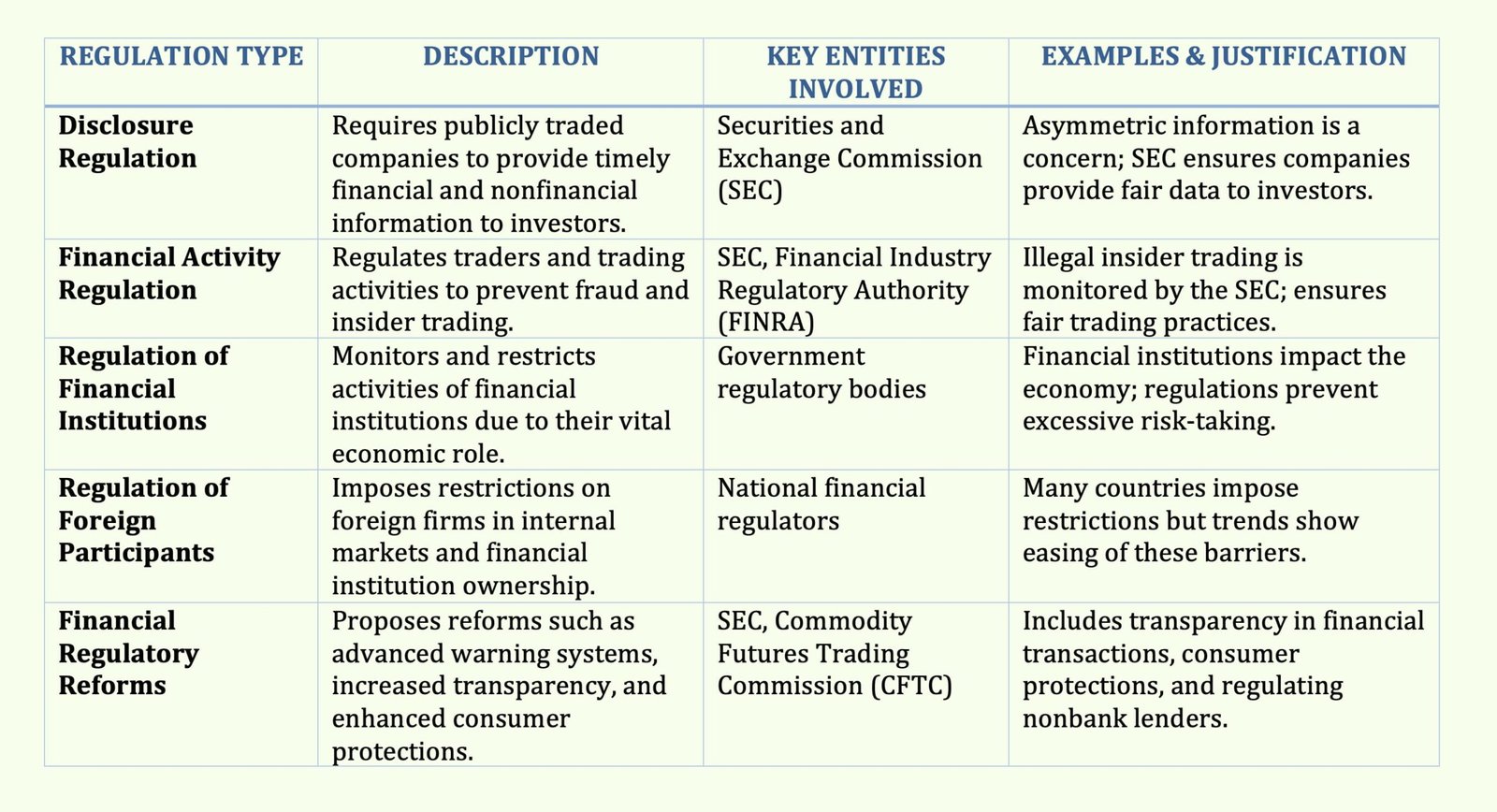Regulating financial activities is essential for ensuring economic stability, protecting investors, and preventing fraudulent practices.
Most governments throughout the world regulate various aspects of financial activities because they recognize the vital role played by a country’s financial system.
Although the degree of regulation varies from country to country, regulation takes one of four forms:
- Disclosure regulation
- Financial activity regulation
- Regulation of financial institutions
- Regulation of foreign participants
Disclosure regulation requires that any publicly traded company provide financial information and nonfinancial information on a timely basis that would be expected to affect the value of its security to actual and potential investors.

Governments justify disclosure regulation by pointing out that the issuer has access to better information about the economic well-being of the entity than those who own or are contemplating ownership of the securities.
Table of Contents
Securities and Exchange Commission (SEC)
Economists refer to this uneven access or uneven possession of information as asymmetric information. In the United States, disclosure regulation is embedded in various securities acts that delegate to the Securities and Exchange Commission (SEC) the responsibility for gathering and publicising relevant information and for punishing those issuers who supply fraudulent or misleading data.
However, disclosure regulation does not attempt to prevent the issuance of risky assets. Rather, the SEC’s sole motivation is to assure that issuers supply diligent and intelligent investors with the information needed for a fair evaluation of the securities.
Rules about Traders of Securities
Rules about traders of securities and trading on financial markets comprise financial activity regulation. Probably the best example of this type of regulation is the set of rules prohibiting the trading of a security by those who, because of their privileged position in a corporation, know more about the issuer’s economic prospects than the general investing public.
Such individuals are insiders and include, yet are not limited to, corporate managers and members of the board of directors. Though it is not illegal for insiders to buy or sell the stock of a company in which they are considered an insider, illegal insider trading is the trading in a security of a company by a person who is an insider, and the trade is based on material, nonpublic information.
Illegal insider trading is another problem posed by asymmetric information. The SEC is responsible for monitoring the trades that corporate officers, directors, as well as major stockholders, execute in the securities of their firms.
Another example of financial activity regulation is the set of rules imposed by the SEC regarding the structure and operations of exchanges where securities trade. The justification for such rules is that it reduces the likelihood that members of exchanges may be able, under certain circumstances, to collude and defraud the general investing public. Both the SEC and the self-regulatory organization, the Financial Industry Regulatory Authority (FINRA), are responsible for the regulation of markets and securities firms in the United States.
Commodity Futures Trading Commission (CFTC)
The SEC and the Commodity Futures Trading Commission (CFTC), another federal government entity, share responsibility for the federal regulation of trading in options, futures and other derivative instruments. Derivative instruments are securities whose value depends on a specified other security or asset. For example, a call option on a stock is a derivative security whose value depends on the value of the underlying stock; if the value of the stock increases, the value of the call option on the stock increases as well.
The regulation of financial institutions is a form of governmental monitoring that restricts their activities. Such regulation is justified by governments because of the vital role played by financial institutions in a country’s economy.
Government regulation of foreign participants involves the imposition of restrictions on the roles that foreign firms can play in a country’s internal market and the ownership or control of financial institutions. Although many countries have this form of regulation, there has been a trend to lessen these restrictions.
Financial Regulatory Reforms
There are several elements of reform that appear in the major proposals:
- An advanced-warning system, which would attempt to identify systemic risks before they affect the general economy.
- Increased transparency in consumer finance, mortgage brokerage, asset baked securities, and complex securities.
- Increased transparency of credit-rating firms.
- Enhanced consumer protections.
- Increased regulation of nonbank lenders.
- Some measure to address the issue of financial institutions that may be so large that their financial distress affects the rest of the economy.

